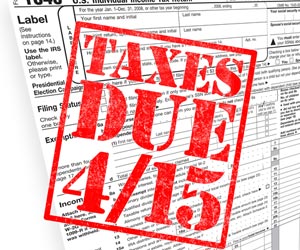Like most people you are probably diligently preparing your taxes so that your taxes are paid on or before Tax Day aka April 15. No one enjoys paying taxes, but it’s the law. So take the time to organize your finances and get your taxes in order to avoid any penalties down the line.

Taxes are incredibly complex. If you plan to deduct your job search expenses, it’s mandatory that you keep detailed records of everything. This is the proof you’ll need in case you get audited.
Before you can qualify for any tax deductions for job seekers, you must follow the rules set forth by the IRS.gov. To deduct job search expenses, your job search must meet the following criteria:
- Job search must be for a job in the same occupation
- Substantial breaks between employment is unacceptable
- The job search cannot apply to your first job
- Deductions on Schedule A (Itemized Deductions) must exceed 2% of adjusted gross income
- Reimbursed costs are not deductible
Based on these criteria, job seekers can deduct the following direct and indirect expenses associated with the job search:
- Resume Costs – Includes paper, mailings, Internet, phone calls, etc.
- Placement Agencies – Includes fees associated with job placements
- Travel Expenses – Includes gas, mileage, and related expenses as long as the primary focus of the travel is to find a job
Check with your tax professional because you may be able to deduct other ordinary, reasonable, and necessary items like: licenses, insurance, education, computer costs, relocation costs, career coaching, tools and supplies, passport fees, marketing costs, etc.
When preparing your taxes, always read the fine print. There are lots of tax laws and loopholes that you need to understand and follow. The best plan of attack is to hire a tax professional to help you sort out your taxes.
Please note that this post is only a guideline. We are definitely not tax experts. Every job seeker’s situation is unique and it’s your responsibility to consult with your tax pro to ensure that your taxes are done properly.
Also remember that if you’re a freelancer or self employed, be sure to pre-pay your taxes quarterly to avoid late payment penalties. Learn more about that here.
See Also:


 Teach English in Asia
Teach English in Asia  Cruise Ship Jobs
Cruise Ship Jobs  Alaska Fishing Industry Jobs
Alaska Fishing Industry Jobs  Sharing Economy / Gig Economy
Sharing Economy / Gig Economy